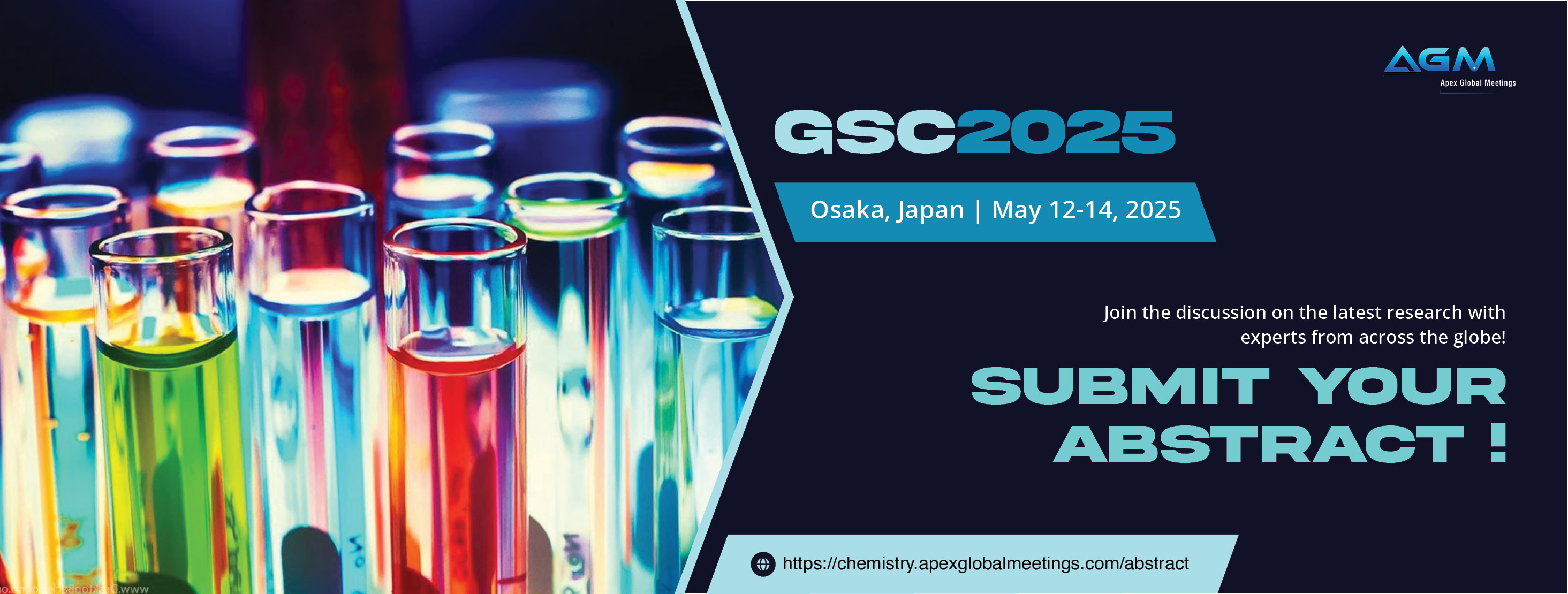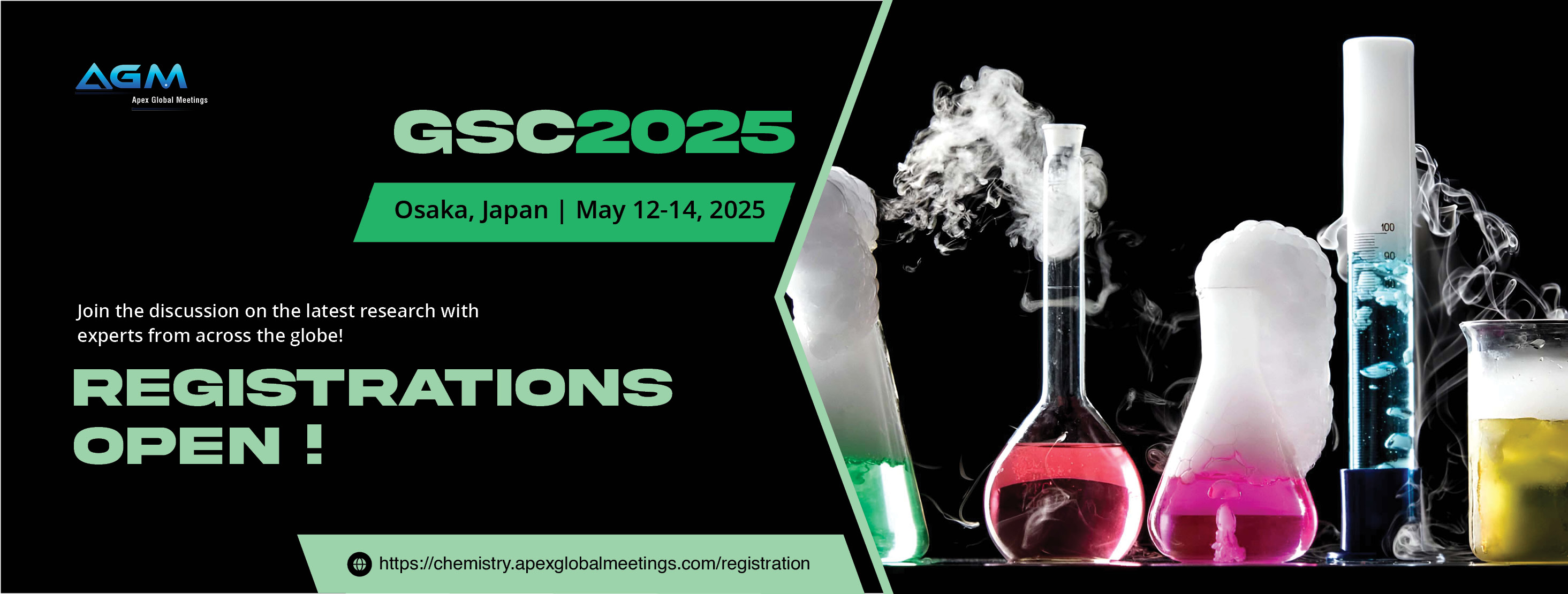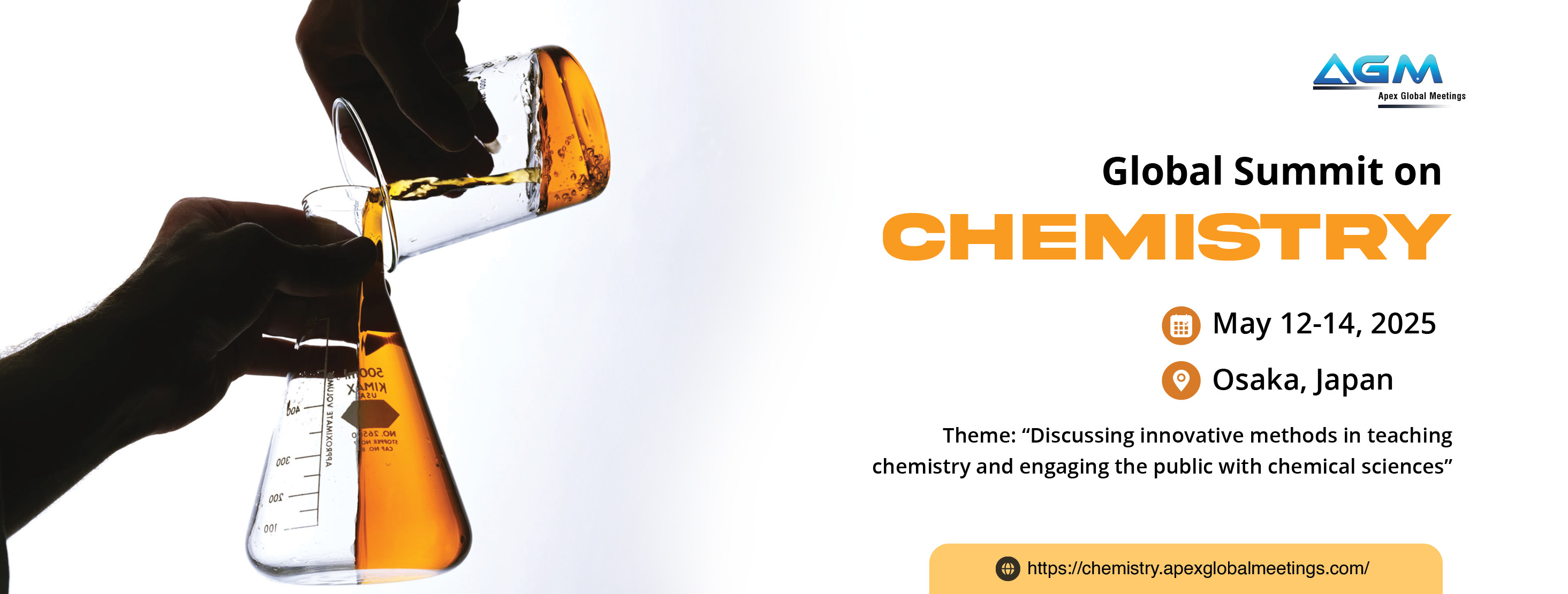

About Conference
Dear Colleagues,
Apex Global Meetings is delighted to announce and cordially invites all the participants across the globe to attend “2nd Global Summit on Chemistry and Pharmaceutical Sciences” (GSCPS2025) on May 12-14, 2025 at Osaka, Japan. Theme of the conference is “Using chemical techniques, Development and production of therapeutic proteins, antibodies, and vaccines.” Scientific Tracks designed for this conference will enable the attendees and participants to learn extremes.
GSCPS2025 aims to gather the renowned scientists, young and brilliant researchers, academicians, healthcare professionals, business delegates, and exceptional student communities across the globe under one roof and organize a healthy discussion so that the researchers and authors can present their work at the conference. GSCPS2025 provides a platform of international standards where you can discuss and share persuasive key advances in Chemistry and Pharmaceutical Sciences. It will be hosting a forum of Plenary, Keynote, Invited lectures and Oral/Postal Presentations.
We accept this gathering will be an exceptionally remunerating instructive and collaborative occasion for the attendees
We look forward to your valuable presence at GSCPS2025 on May 12-14, 2025, Osaka, Japan.
Green Chemistry: Developing sustainable and environmentally friendly chemical processes.
Nanotechnology: Using Nano scale materials and techniques for drug delivery and diagnostics.
Biopharmaceuticals: Advances in the production of therapeutic proteins and antibodies.
CRISPR and Gene Editing: Applications in drug development and genetic disorders.
Artificial Intelligence in Drug Discovery: AI and machine learning to predict drug interactions and design new drugs.
Precision Medicine: Tailoring medical treatment to individual characteristics.
Immunotherapy: New treatments harnessing the body's immune system to fight diseases.
Antimicrobial Resistance: Developing new antibiotics and alternative treatments.
Metabolomics: Studying metabolites to understand disease mechanisms.
3D Printing in Pharmaceuticals: Customizable drug formulations and personalized medicine.
Natural Product Chemistry: Isolating and modifying natural compounds for drug development.
Bio conjugation Techniques: Creating complex molecules for targeted therapies.
Peptide and Protein Drugs: Design and delivery of peptide-based therapeutics.
Chemical Biology: Using chemical techniques to study and manipulate biological systems.
Chiral Chemistry: Synthesizing enantiomerically pure compounds.
Medicinal Chemistry: Discovery and optimization of new therapeutic agents.
Synthetic Biology: Engineering organisms for pharmaceutical production.
Pharmacogenomics: How genes affect individual responses to drugs.
Biosimilars: Development and regulation of generic versions of biologics.
Drug Delivery Systems: Innovative ways to deliver drugs more effectively.
Quantum Chemistry: Applications in molecular simulations and drug design.
Structural Biology: Understanding the structures of biological molecules.
Bioinformatics: Analyzing biological data to inform drug discovery.
Epigenetics: Drugs targeting epigenetic modifications.
Micro biome Research: Impact of gut micro biota on drug efficacy and metabolism.
Targeted Cancer Therapies: Developing drugs that specifically target cancer cells.
Exosomes and Extracellular Vesicles: Using cell-derived vesicles for drug delivery.
Theranostics: Combining therapy and diagnostics in a single platform.
The global chemistry industry is a multifaceted and integral sector of the economy, with applications across various domains, including pharmaceuticals, materials, agriculture, energy, and additional. This market analysis provides an overview of the chemistry industry, its current trends, occasion, and challenges.
The market size of the chemistry industry is estimated to be over $5 trillion in 2022. It is expected to experience steady growth in the coming years, driven by several factors. One significant driver is the increasing demand for pharmaceuticals. The on-going global healthcare challenges have led to a surge in pharmaceutical and biotechnology product demand, which heavily relies on chemistry for drug discovery and development.
Materials science is another area driving growth in the chemistry industry. Advancements in this field have led to innovations in electronics, construction, automotive, and additional. Chemistry is at the forefront of developing new materials with improved properties and performance, catering to the evolving needs of these industries.
The energy sector is undergoing a transformation with a strong focus on renewable energy sources and energy storage technologies. Chemistry plays a pivotal role in the development of batteries, solar cells, and other clean energy solutions. This segment presents substantial growth potential as the world seeks cleaner and additional sustainable energy solutions.
In the agriculture sector, chemistry is instrumental in the development of fertilizers, pesticides, and genetically modified crops. As the global population continues to grow, the demand for sustainable and efficient agricultural solutions is increasing. This segment presents developments for chemistry to contribute to food security and sustainability.
Overall, the chemistry industry is dynamic and essential in addressing global challenges, including healthcare, environmental sustainability, materials innovation, and clean energy. While developments for growth and innovation exist, challenges related to regulatory compliance, environmental responsibility, and the need for constant research and development also persist. Nevertheless, the industry is poised to continue its growth trajectory and remains a critical driver of technological progress and economic development worldwide.Important Dates
Abstract Submission Deadline
15-04-2025Earlybird Registration Deadline
August 15, 2024Standard Registration Deadline
August 20, 2024Onspot Registration
May 12th, 2025Plenary Speakers

Bin Hu

Dariusz Jacek Jakobczak

Dr. Chunshan Song
Keynote Speakers

Dr.Mary Anbarasi Johnson

Dr. Sergey V Suchkov
Russia

Dr. Loai Aljerf
Syria
Registration
Registration Includes
- Access to all conference sessions, poster and exhibition area
- Conference kit including name tag, program booklet and Abstracts book
- 2 Coffee breaks and lunch for all the event days of the conference
- Certificate of participation from Conference chair/ Session chair
- Access to the all scientific sessions
- Access to Business Development Sessions and Global Networking Session
Benefits of Joining Conference
- Encouraged to publish full length articles in Supporting Journals with discounted APC charges
- Best Oral, Poster and Young Research Forum (YRF) presentation awards
- Get Opportunity to Collaborate with future Apex Global Meetings
- Avail Group Booking Discounts
- All the articles presented in this conference will be considered for publications as per their quality in SCI / SCIE / SCOPUS / Peer Reviewed journals of Springer and / or other publishers
Group Booking Discounts
Groups of three or more will receive a Special discount by using the group code. If you have any queries, please contact us at or call
gsc@apexglobalmeetings.com






